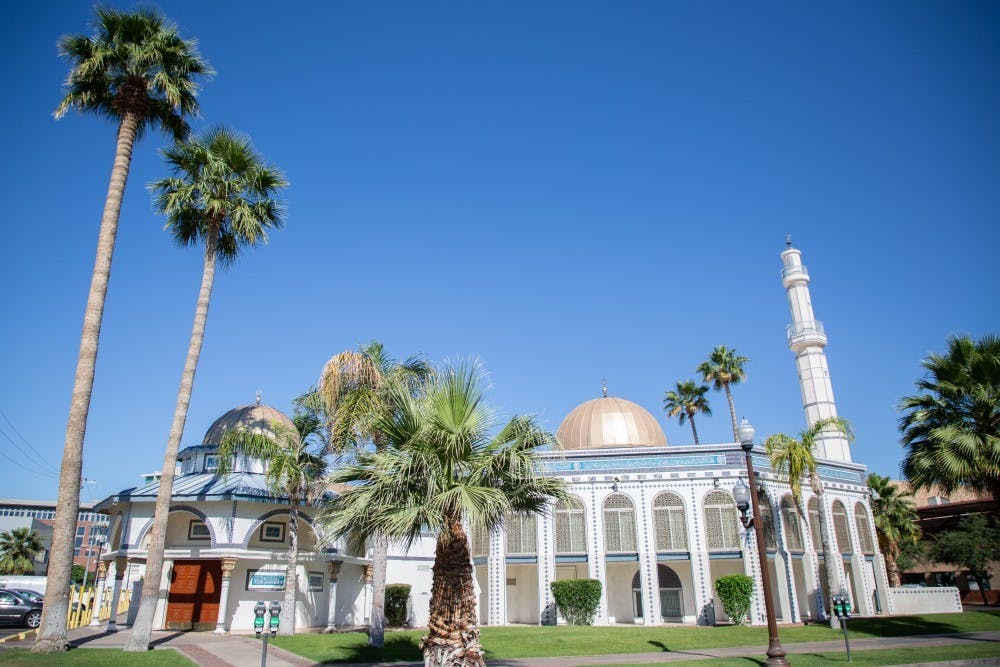ASU opened the Center of Muslim Experience in the United States this semester with intentions to serve the Muslim student population and educate others on Islam.
While the center does not have a physical location, its main objective is to transform the image of Muslims and of Islam in the United States by partnering with local Muslim communities, doing research on the community and hosting outreach events, according to its website.
"Islam and Muslims have always sort of been defined, particularly since 9/11, as either a security threat or as outsiders," said co-director of CME-US and assistant professor of religious studies, Chad Haines.
Haines and co-director and history professor Yasmin Saikia are using the center to combat this image and teach about the Muslim narrative in America.
Haines said historically Muslim voices have been erased, and once they are allowed to speak up, their words are "framed" by what others want to hear.
"We're not violent. We are peaceful. Islam means peace. That's what they wanted to hear. We condone the violence. But that's not all that's happening, right?" Haines said.
Saikia said there is much history to the Muslim identity that is "absent in the narratives of history" as it's often forgotten that the U.S. was built by many Muslim slaves. CME-US aims to highlight this history in order to better instill Muslim citizens' place in the U.S.
Last semester, a Quran was found damaged in the Interfaith Reflection Room at Hayden Library on ASU's Tempe campus. Haines said part of CME-US's goals is to prevent and provide support in incidents like these by providing knowledge on the Muslim community.
Raneem Sbai, an American-Syrian Muslim student studying psychology, said due to ASU's diverse student population, she has not experienced negative encounters on campus. No one has ever been judgmental, but she has gotten questions about her religion, Sbai said.
Sbai said she is happy to help educate others when questions come up. With CME-US now open, even more students could learn about Islam. Sbai hopes to connect with fellow Muslims at ASU and hoped the center may be able to help provide that.
"I'm too shy to go up to them," Sbai said. "But I would love to get to know more Muslims."
Saikia and Haines hope for the center to become more established in the spring. Saikia said they plan to bring students together through cultural events like a Muslim food week in the Memorial Union.
"Muslim food that can be shared and enjoyed by many creates this human awareness and human respect for one another," Saikia said.
Events like these can bring together international Muslim students and American Muslim students who "otherwise may not meet," Saikia said.
Students themselves are also getting involved in attempting to shift how Muslims and Islam are viewed.
Frough Tahiry is the president and founder of the Afghan Students Association at ASU and a graduate student studying business analytics.
Tahiry, like Sbai, has not personally experienced any negative encounters because of her Muslim identity, but has heard stories of fellow Muslims eating at restaurants and "children feeling insecure to be sitting next to them, to have an interaction with them."
"There is all this stigma and misconception about Afghanistan and the background of Islam," Tahiry said.
In response to this, Tahiry relaunched the Afghan Students Association with similar goals to CME-US.
Tahiry chooses not to wear a hijab, and has faced backlash from other Muslims for this choice.
"There are people who are criticizing you. People who are trying to kind of make you a 'good' Muslim," Tahiry said. These contribute to the goals of CME-US on creating dialogue about what it can mean to be Muslim. In addition, CME-US will also be a place for Muslims to connect on practice.
With "enough interactions with very clear purposes," Tahiry said both CME-US and the Afghan Students Association have the ability to reduce the number of stereotypes and prejudice against other identities.
"ASU is known for innovation, right? This is a major innovative idea that you can even change the narrative from the negative and create a positive narrative for (a) better relationship with people so that you can open space for conversation, dialogue and better understanding, which builds community, which builds the country," Saikia said.
Haines and Saikia said the center's objective is in the title. CME can be read as 'see me' and the 'US' reflects people as a whole.
"We are part of the same story, the same journey," Saikia said.
Edited by Jasmine Kabiri, Wyatt Myskow, Sophia Balasubramanian and Piper Hansen.
Reach the reporter at sfan32@asu.edu and follow @moopy_shoepee on Twitter.
Like The State Press on Facebook and follow @statepress on Twitter.
Sherry Fan is a journalism student hoping to educate audiences on underrepresented communities. She has previously worked producer roles for the film company, Summery Productions.




